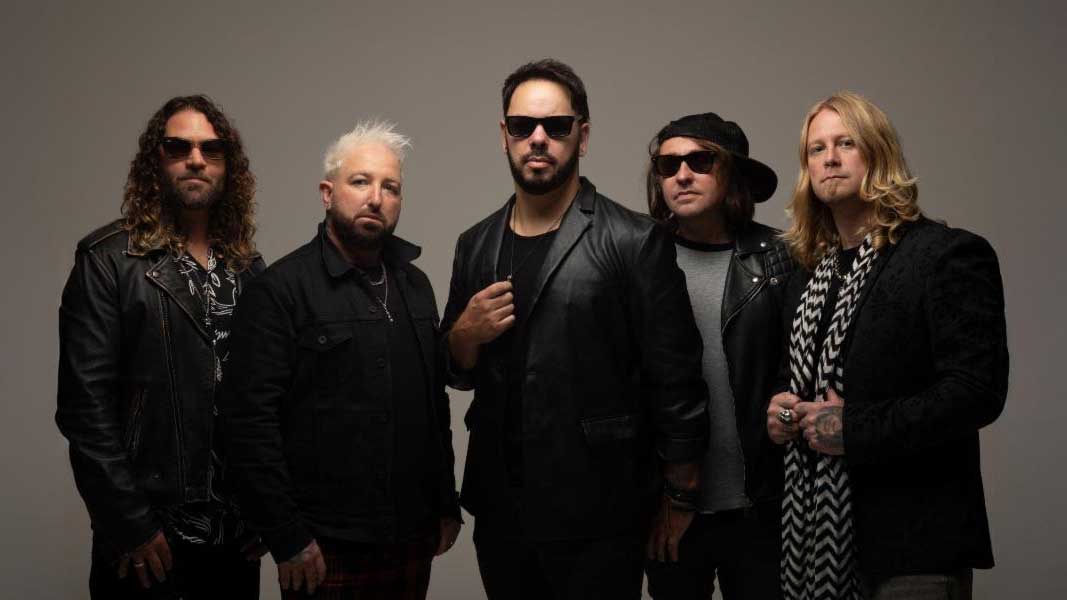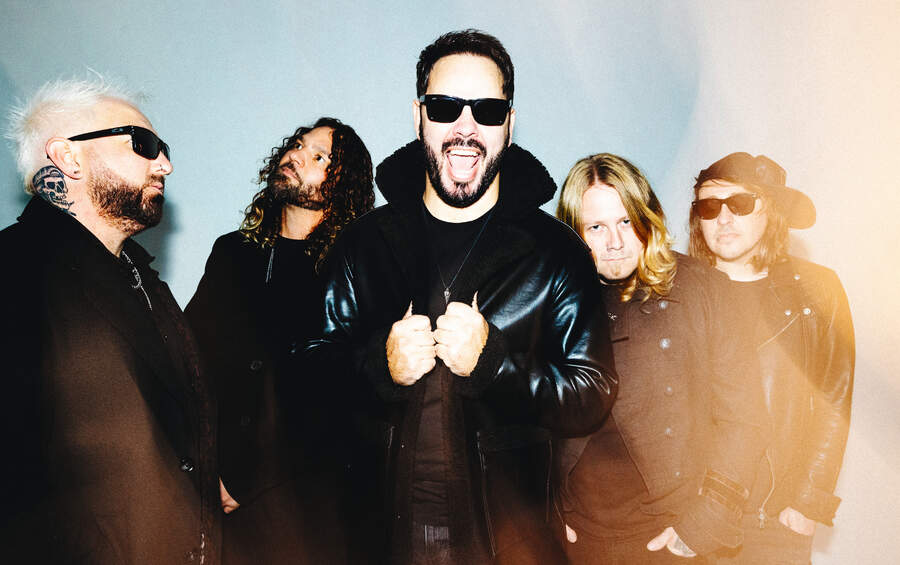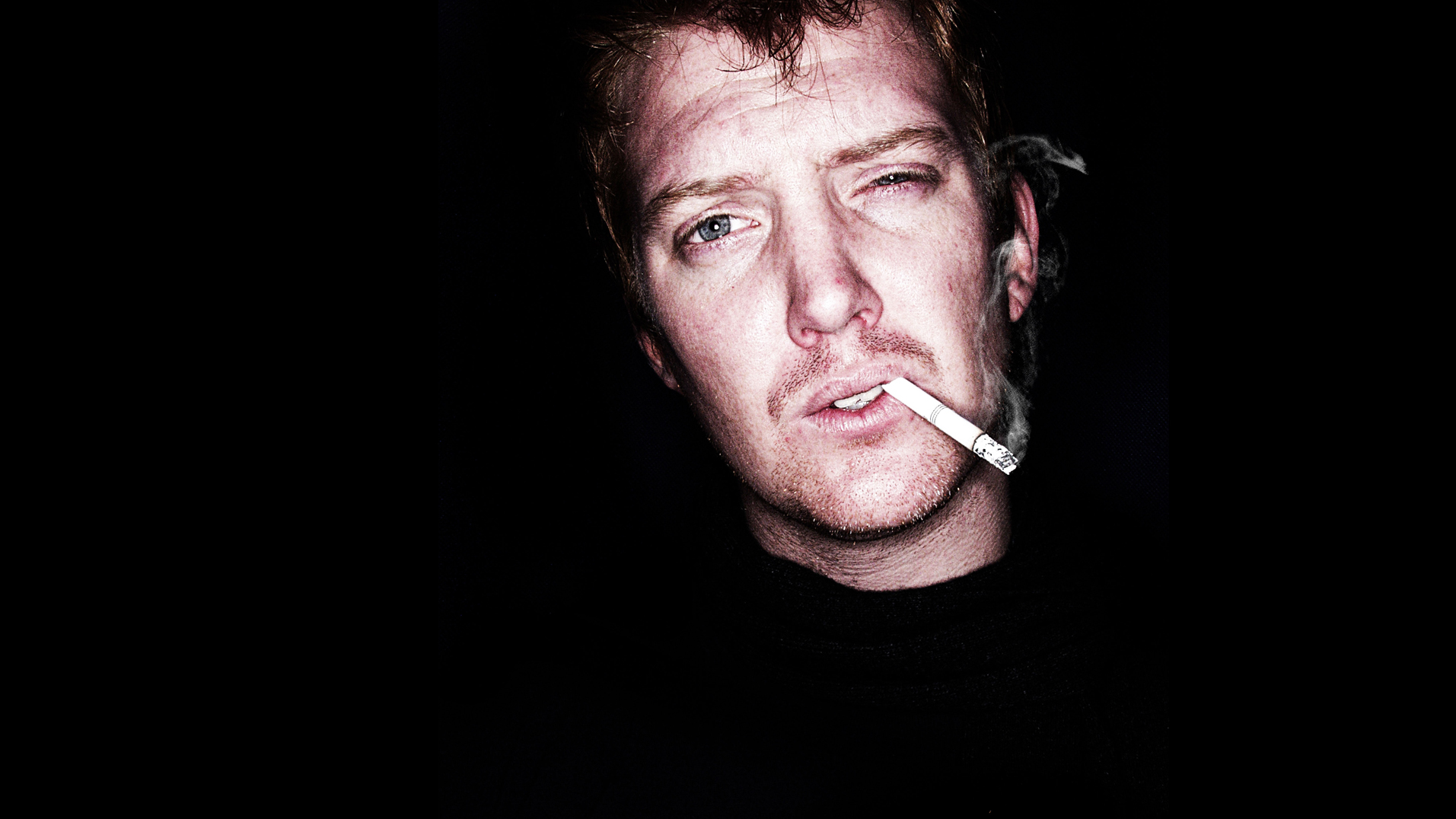"Trying to work it all out, that's what makes us human": Those Damn Crows and the search for meaning in uncertain times
On their chart-topping album God Shaped Hole, Those Damn Crows turn their attention to the existential fears we all face

Select the newsletters you’d like to receive. Then, add your email to sign up.
You are now subscribed
Your newsletter sign-up was successful
Want to add more newsletters?

Every Friday
Louder
Louder’s weekly newsletter is jam-packed with the team’s personal highlights from the last seven days, including features, breaking news, reviews and tons of juicy exclusives from the world of alternative music.

Every Friday
Classic Rock
The Classic Rock newsletter is an essential read for the discerning rock fan. Every week we bring you the news, reviews and the very best features and interviews from our extensive archive. Written by rock fans for rock fans.

Every Friday
Metal Hammer
For the last four decades Metal Hammer has been the world’s greatest metal magazine. Created by metalheads for metalheads, ‘Hammer takes you behind the scenes, closer to the action, and nearer to the bands that you love the most.

Every Friday
Prog
The Prog newsletter brings you the very best of Prog Magazine and our website, every Friday. We'll deliver you the very latest news from the Prog universe, informative features and archive material from Prog’s impressive vault.
Last year, in front of 65,000 people in Germany, Shane Greenhall hit his stride. His band Those Damn Crows were on tour with Böhse Onkelz – virtually unknown in the UK, massive in their homeland – and mega-crowds were the norm. The Crows had German fans from past shows, but they still faced a mammoth task: converting an audience that wasn’t there for them. By this point they were accustomed to playing for thousands, and tens of thousands, across Europe. It was an intense period. They missed Wales. Arguably, though, it was the making of them as a proper big-stage band.
“I think I’m better being a bit uncomfortable,” singer Greenhall muses. “I think that brings out something in me, performance wise, a determination, this focus. I don’t get wound up in the emotion. It’s about proving yourself. I kind of like that battle.”
If there’s one thing Those Damn Crows do really well, it’s proving themselves when the odds are stacked against them. Resilience in the face of personal losses. Commitment to their fans. Closeness as a group with years of shared history, setbacks, the natural beauty and turbulent times of their home town.
On their new album, God Shaped Hole, they meet all that with some of their biggest music yet. A varied, taut, punchy selection (by turns meaty, pop-geared and dreamlike), it confronts the searches and existential fears we all go through at one point or another – relationships, religion, science, drugs, technology. The things we look to for meaning. For answers in uncertain times.
For Greenhall, after years of “overthinking everything”, there’s now a joy in not knowing.
“The best bit of this [life] is the process,” he says, “trying to work it all out, that’s what makes us human. There’s a danger of losing that, because AI can do so much now. But you won’t learn from life experiences unless you do it yourself.”

Sitting across from us at a gastro pub in Laleston, a village in South Wales, Greenhall has a strapping but gentle presence – tall and barrel-chested, with big, tattooed arms, wearing a black cap and T-shirt. He orders fish and chips and a coffee, serious but relaxed on home turf. He knows all the bar staff (he and his girlfriend live locally), having grown up a short drive away in Methyr Mawr, close to the beach of Ogmore-By-Sea.
Sign up below to get the latest from Classic Rock, plus exclusive special offers, direct to your inbox!
It was, he says, an idyllic childhood. His father grew fruit and vegetables. In school years Shane played football for Bridgend Town. Crows drummer Ronnie Huxford, guitarist Ian ‘Shiner’ Thomas (‘Shiner’ is a hangover from adolescence, after an unfortunate collision with a lamppost) and bassist Lloyd Wood are all old school friends from the Valleys – guitarist David Winchurch was “a townie”. They all still live locally, and their bonds with the area run deep.
“I get homesick really quickly these days,” Greenhall admits. “There’s no substitute for home. I can go to amazing places, and we have as a band, but there’s just something about Wales. I just love it.”
There’s sadness, though, in these images. The suicides that drew national attention to Bridgend in the 00s. The death of Greenhall’s father, his first musical role model, from cancer. Similar losses suffered by his bandmates. Yet there’s a sense that their home town has their back; friends and family who keep them as down-to-earth as they all are, whatever successes happen elsewhere.
“But that won’t ever stop us from having drive and aspirations,” he adds. “I remember saying to Ronnie, before the band had even done anything: ‘Look, man, if I’m in this, I’m in, there’s nothing else.’ That’s the only way I do things.”
Greenhall grew up in search of God – or rather, his dad did. A naturally sociable guy, Greenhall Snr took his children to different Christian churches and befriended the local Mormons.
“He called himself a spiritual man, as opposed to religious,” Shane explains, “but he went through all this navigating, like, is there a god? What type of god? So I was always around this idea of a god, this idea of a higher being, and a better way to be a human being.”
In some ways that search has lingered. Grieving for his father left a fingerprint on all his songs. He habitually listens to podcast theories about the universe, technology, the nature of people. As someone who never really stops writing music (on the go, at home watching TV…) it’s been easy to filter these things into his band’s new songs, some based on demos and voice notes from years ago.
“The truth is we know very little,” he muses. “Yet with that information we could be on the verge; I think with AI in particular, we could cross a line where we can’t go back. It could be a real positive thing, or super-negative.”
Earlier in Those Damn Crows’ lifespan, Greenhall wrote a song called God Shaped Hole. It was never released, but the title stayed with them all. Come 2024 – with debate about unpredictable world leaders, conflicts and technological advancements reaching a new apex, alongside seas of individual crises in an increasingly complicated world – it felt like a timely sentiment. One that spoke to global concerns as well as hopes, fears and questions on a more intimate, personal level. The ‘god-shaped holes’ in all our lives.
“That’s it,” he says. “Because you can’t control the bigger things, but if you apply that in your own way of thinking and being, I guess you’ve got a chance to dream any world you want. You can decide what you want to do.”
The Dali-esque album cover contains an image for each song. No Surrender, a beefy ode to never giving up, is the tree. Gorgeous, Stone Temple Pilots-esque grunge anthem Dreaming is the figure rowing a boat up a road (dream logic, like flying off a building or running through sinking sand – here a metaphor for making what you want of reality). The metallic Let’s Go Psycho is the jester, a character from a disturbing DMT (dimethyltryptamine, a powerful psychedelic) trip that Greenhall experienced years ago.
Following a powerful dream about his late father and grandparents, he’d wanted to regain that feeling of connection – of answers that seemed clear in the dream, but faded upon waking. “They were holding hands,” he recalls of his grandparents in the dream. “They were so in love. And all I used to remember [was] my grandma and my granddad bitching to one another; they were really heavy smokers.”
DMT ingested, it all got very macabre. After three puffs, Greenhall felt himself falling into a dungeon, the Hindu deity Ganesha in one cage, a jester hurling insults from another. “And this jester is saying: ‘You’re pathetic, you’re an idiot, you thought you could come here and get all the answers…’ and other horrible things. I felt like I was trapped in this place for years,” Greenhall stops, then laughs, “until I heard my friend’s voice saying ‘I think you took too much!’”
Initially that experience left him lost. In time, though, he revisited it with a sense of acceptance. Facing the murky sides of life with open eyes.
“We’re almost fuelled by fear right now of the unknown,” he says, Disco Inferno playing over the pub speakers. “But I think that’s a good place to be. You can’t react until you know. For someone who overthinks everything, that’s been quite freeing. So I’m almost more relaxed now. I’m still curious, always will be. But it’s more [about] gratitude now than ever.”
He thinks about this, then: “But at the same time I do think about my kids a lot, thinking: ‘What world are they gonna grow up in?’”
On the God Shaped Hole cover, Still is represented by a man on a pew. The album’s closing track – a deceptively simple ballad, its gentle, major-key fragility complemented by heartbreaking lyrics – it’s strummed on an old £120 Fender guitar that Greenhall had had for years. An effective vessel for one of his darkest memories.
“That’s what it should be, good music,” he says, recalling the more expensive gear they tried recording the song on. “It doesn’t matter what instrument you use, what producer, what studio you’re working in. If you’ve captured something, you’ve captured it.”
This particular ‘something’ happened 10 years ago. A lot had come to a head. Greenhall’s first marriage was over, and his father had died. His music career was yet to happen. For a while, a part of him went somewhere else. On Still he sings: ‘No one will know if I disappear.’
“I didn’t know what was going to happen,” he remembers. “I didn’t know I was going to be touring, didn’t know I was gonna be writing my own music. I felt like I’d failed, like I’d let my children down. My life was literally gone – that’s how it felt.”
One night, he drove to the edge of a cliff at Southerndown Beach in South Wales. Much of his childhood was spent running riot on the dunes there. His father’s memorial bench sits a few paces away at Dunraven Castle. He walked to the edge and looked down.
“I’ve told almost no one this, because it sounds like I made it up,” he half-laughs nervously. “It’s pitch black, freezing cold. My car lights are on, beaming out to the sea, and I get out of the car and I can’t, I’m not…”
He searches for the right words, as many who have contemplated suicide do.
“I’m not sitting here talking about depression. I had no idea what I was doing, so it wasn’t a premeditated thought. I was just…” he shrugs. “I don’t know, I didn’t feel like I was going there to do something. But at the same time, if it happened, I didn’t care. I wasn’t thinking of the consequences. I could feel the wind sort of swaying me, and I thought: ‘Yeah, I’m going to.’”
Greenhall was 13 when his own parents divorced. It changed his relationship with his younger siblings, putting him in a protective authority position. “I became like ‘the man of the house’. It killed my sister and brother when my mum and dad split up. That’s why it [my own divorce] hit me so hard, because I didn’t want that for my family.”
But then, out of the blue, a huge seagull landed on his car. Greenhall tried to shoo it away, but it didn’t budge. For three minutes it stood, fixing him with a piercing stare. It was enough to shift Greenhall’s focus away from the cliff edge. From that night onward he became conscious of certain turns in his life – the presence of something like fate.
“You know, it could have gone anywhere, but he sat on my bonnet, and he looked at me as if to say: ‘What the fuck are you doing?’ Honestly, this bird was fucking enormous.” He shakes his head. “It’s just all these little nuances of life, something else happens and puts you in a different mindset, completely. If you’re lucky enough to stick around, these experiences change your life. And if you can have a few of them that don’t break you – that can break you as a person, but not break your spirit – I think that’s a good thing."
Our empty plates are taken away. A group of women with birthday balloons arrive at another table, otherwise we’re the only customers. “I think that’s the best thing we can do as human beings: look at something slightly differently,” he concludes. “Yes, it’s a shame it did happen, but what can we do about it? How can you think about it differently? That’s an amazing power to have.”
Afterwards, Greenhall drives me to the train station, en route to rehearsals at the Crows’ headquarters on the outskirts of Bridgend. On Sundays they all play football nearby, when time allows. We talk about the industry, the recent Trump/Zelensky fall-out, his 18-year-old daughter’s musical ambitions.
“She loves all the West End musicals stuff,” he says proudly. “She’s finding her voice but, man, it’s… There’s very few people that make me cry every time. Every time she sings, it’s like that. It’s amazing seeing her having the bug.”
At the Crows’ Cardiff Arena show last year, Greenhall met his daughter’s eyes from the stage. All his children were in the balcony. Emotions ran high.
“Afterwards my youngest son said: ‘Dad, I can’t believe how cool you are!’ And then my daughter was hugging me, saying: ‘I’m so lucky to have you as my dad.’ I was like: ‘Holy shit, this is unbelievable. Waited my entire life for this.’”
His face breaks into a smile. “It don’t get better than that.”
On the train station platform it’s quiet and still. Grey skies are punctuated by tall cranes, seagulls swoop overhead. An enormous one lands on the footbridge.
God Shaped Hole hit number one on the UK album chart on April 18, 2025.

Polly is deputy editor at Classic Rock magazine, where she writes and commissions regular pieces and longer reads (including new band coverage), and has interviewed rock's biggest and newest names. She also contributes to Louder, Prog and Metal Hammer and talks about songs on the 20 Minute Club podcast. Elsewhere she's had work published in The Musician, delicious. magazine and others, and written biographies for various album campaigns. In a previous life as a women's magazine junior she interviewed Tracey Emin and Lily James – and wangled Rival Sons into the arts pages. In her spare time she writes fiction and cooks.





